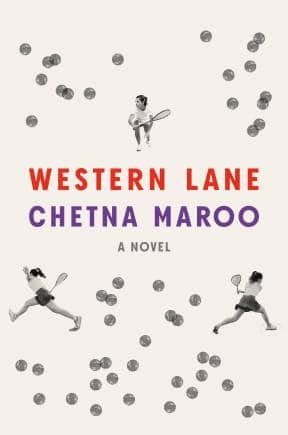



In a famous passage describing the composition of his early short stories, John Updike wrote that the feeling was akin to “packaging something as delicately pervasive as smoke, one box after another, in that room, where my only duty was to describe reality as it had come to me - to give the mundane its beautiful due”.
 Chetna Maroo’s Western Lane
Chetna Maroo’s Western LaneUpdike’s way of doing this was through a profusion of lush and adjective-filled sentences. There are other prose styles that can give the mundane its beautiful due with as much nuance and precision. Chetna Maroo’s debut novel, Western Lane, is a case in point.
At less than 200 pages, Western Lane is one of the shortest novels on the recently announced Booker Prize longlist, and it could well be the most affecting. Its strength lies in the sensitive delineation of loss and fortitude through everyday actions, with the characters cycling through their “seasons of distress and grief”, as one old hymn puts it.
Maroo, a British-Indian writer from Kenya, has fashioned a delicate, quiet story set among the 1980s Gujarati community of Luton, a town near London. In these pages, there are no outcries or proclamations, simply the accrual of implications and revelations over time.
Western Lane deals with the situation of Gopi, the youngest of three adolescent sisters, coming to terms with their mother’s untimely death. The father, an electrician-for-hire, decides to plug the hole in their lives by interesting them in squash and Gopi, the narrator, turns out to have a natural aptitude for the game. She becomes a frequent visitor to the squash courts at Western Lane, a nearby club in the shadow of the Vauxhall factory.
In the past, too, squash has occasionally found its way into works of fiction. For a character from Ian McEwan’s Saturday, playing a contested game feels like “an extended metaphor of character defect,” and “every error he makes is so profoundly, so irritatingly typical of himself, instantly familiar, like a signature, like a tissue scar or some deformation in a private place”. As a counterpoint, a character from John Irving’s A Widow for One Year feels that “the terrific thing about hitting a ball that hard, and for that long, was that when she was done, she had absolutely nothing on her mind”.
For Gopi, “the echo, which is the ball striking the wall of the court, is louder than the shot itself,” and this is “what I hear when I remember the year after our mother died.” As she gets better at the game, she finds that “a clean hit can stop time. Sometimes it can feel like the only peace there is”. Later, she confesses: “I think there’s a glass court inside me.”
When she tries to recall her mother, “insignificant things” come to mind: “The height of her. Her arms on the arms of her chair, bent at the elbows. The dust that blackened the soles of her feet.” Her strenuous practice sessions, videos of Jehangir Khan, and analysis of others such as Geoff Hunt somewhat assuage her feelings.
As the months pass, Gopi has to grapple with the reactions of her sisters and her tentative attraction to a squash partner at the club. Her father, dealing with demons of his own, is sometimes solicitous, sometimes indecipherable. And there’s the nosey presence of her Edinburgh-based aunt, who has her own ideas about how children should be brought up. These include strong opinions about whether she should be allowed to participate in a squash tournament, which forms the book’s finale.
At times, Gopi’s sensations are presented almost as though she is underwater, submerged in a silent world through which she can discern murky shapes. The games she participates in don't take up the majority of the novel, but they are central to her rising to the surface. This process is wonderfully represented through small acts, intimations, and shifts in mood.
In a sense, there’s nothing special about the bare-bones story of Western Lane. After all, dealing with loss and finding redemption through sport is a common trope. What sets the novel apart is the style of narration that shows how Gopi tackles her predicament by creating new forms of meaning. Western Lane achieves this with concision and restraint. It also serves as another reminder that a novel doesn’t have to be hefty to make an impact.
Discover the latest Business News, Sensex, and Nifty updates. Obtain Personal Finance insights, tax queries, and expert opinions on Moneycontrol or download the Moneycontrol App to stay updated!
Find the best of Al News in one place, specially curated for you every weekend.
Stay on top of the latest tech trends and biggest startup news.